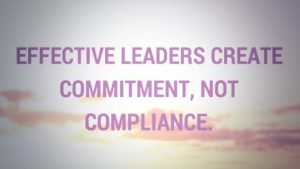Compliance vs. Commitment: Increase Employee Engagement
By Sarah Zasso, SHRM-SCP, SPHR
Have you ever rolled out a new widget (procedure, program, software, etc.) and you thought your employees would jump up and down with excitement – only to have them react with stoic, unhappy responses and negativity? You thought this was what they wanted, so why aren’t they happy? That is a fair question.
To answer that, ask yourself, “Do I want my employees to do what I ask because they HAVE to or because they WANT to?” That is the difference between Commitment vs. Compliance.
Reality is that sometimes, employees need to do “something” because they have to and it is part of their job. But, there are many times that employers miss the opportunity to engage their staff.
Here is an example:
Your staff has been complaining (what seems like) forever about your current software. They say it is outdated, not user friendly, and time consuming. With the best of intentions – you endlessly search, demo, and test new software. After months of hard work, you are excited to roll out the new software to the staff and are surprised that they don’t seem happy. Confusing, right? The old software was a problem and you solved it, they should be ecstatic! Sorry, but no.
This was a missed engagement and commitment opportunity. Instead, you could have involved the employees in the software search and selection process. This would have allowed them to be heard, and invest ideas and process requirements regarding the new software. When people are part of the solution, they tend to be more committed.
Strive for a culture of commitment. When you have a compliance culture, employees tend to do “just enough” to comply and that oftentimes can result in resentment and reduced productivity.
Where in a commitment culture, employees feel like they have a voice, they have some control. Not only does this often fulfill an intrinsic need, but it engages the employee and increases company loyalty.
A few tips to increase employee engagement and create a culture of commitment:
- Allow your employees to manage their own workload (set their own reasonable deadlines)
- Solicit feedback before making decisions that can affect their work (where appropriate)
- Empower your employees to make decisions and take action (where appropriate)
- Share the “Why” behind decisions
- Encourage ideas
- Be approachable
Create a culture where employees want and are committed to individual and company success. Engage them!
This article is for general information purposes only. I am not an attorney; accordingly, the information presented is not legal advice, and is not to be acted on as such.


